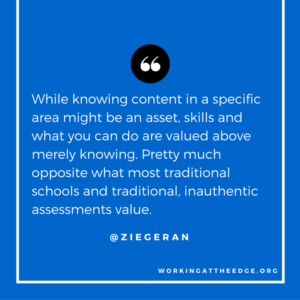 This is the fourth and final post in a series that has emerged as a result of a week-long trip to Silicon Valley with a group of educational leaders from the University of Pennsylvania Midcareer Doctoral Program in Educational Leadership. Be sure to check out previous blog posts providing my reflections on the daily adventures. You can find other posts in this series here:
This is the fourth and final post in a series that has emerged as a result of a week-long trip to Silicon Valley with a group of educational leaders from the University of Pennsylvania Midcareer Doctoral Program in Educational Leadership. Be sure to check out previous blog posts providing my reflections on the daily adventures. You can find other posts in this series here:
- So you think you’re a digital leader?
- 4 cultural signs you’re ready to push innovation
- Does your leadership need a system software upgrade?
When I was in school in the 1970s and 80s, there were no digital tools, and content was not nearly as abundant as it is today. As learners, we basically were limited to a few sources of information – the teacher, the textbook and the library. There was a heavy emphasis on content, and the assessments reflected this. For example, I remember learning about the functions of the branches of government. We listened to the teacher lecture, took notes, read the textbook and took a final test largely focused on facts about the three branches. And we can’t forget this Schoolhouse Rock video.
That was then, but the opportunities for learning today are so much greater. How does access to a digital device and (essentially) the sum of human knowledge change how we value content in relation to skills and attitudes? How should it, and what are schools doing to prepare students for a world of different expectations?
Over the course of a week in the San Francisco area, we met with people working in the edtech startup world and visited several progressive schools. I was very curious how the people we encountered perceived the balance between knowledge and skills within their work environment. I repeatedly asked questions about the knowledge and skills our graduates will be expected to have entering careers such as these. What did I hear? What is most valued?
- Capacity to be a learner
- Problem finding/problem solving coupled with making sense of data
- Social awareness – empathy was a big one! Understanding the needs of others.
- Failing forward and often – reiterate and persist through the creative process
While knowing content in a specific area might be an asset, skills and what you can do are valued above merely knowing. Pretty much opposite what most traditional schools and traditional, inauthentic assessments value.
Since the visit to Silicon Valley, I had the opportunity to extend the conversation around real world skills with Jordan Pedraza, head of community at Remind, Inc, an edtech startup company. Check out the podcast on TLTalkRadio where my colleague Lynn Fuini-Hetten and I spoke with Jordan about these related topics:
- One of the things we have been working on this year is to describe the knowledge, skills and dispositions we want our graduates to have leaving school to go on to college and career. Describe for us the work environment at Remind, and what are the required knowledge, skills and dispositions to be successful?
- How important is the knowledge students learned in K12 and college when they walk in the door to work at Remind? How about skills and dispositions?
- What suggestions do you have for high school students wanting to pursue a career in the startup field? What experiences might they take advantage of now while in high school?
- Designing learning spaces is a hot topic of conversation in education right now. Describe the work culture at Remind. What does it look like? Sound like? How is it different from the traditional work culture, and are there any aspects you wish would have been a part of your K12/college learning environments?
- What beautiful questions are you thinking about these days? What are you working on? What’s inspiring you?
Does school leadership have the capacity to shift the conversation away from content toward skills and attitudes – from simply knowing to doing?
Connect with Randy on Twitter and on the TLTalkRadio podcast!
Get new content delivered to your inbox and the ebook 3 Key Principles of Digital Transformation. The ebook contains valuable information from my experience leading a digital transformation and working with a variety of stakeholders over the past decade.
- A silver lining - January 22, 2022
- Is our use of tech working against us? 🤔 - September 8, 2021
- What’s NOT going to change in the next 10 years? 🤔 - September 7, 2021